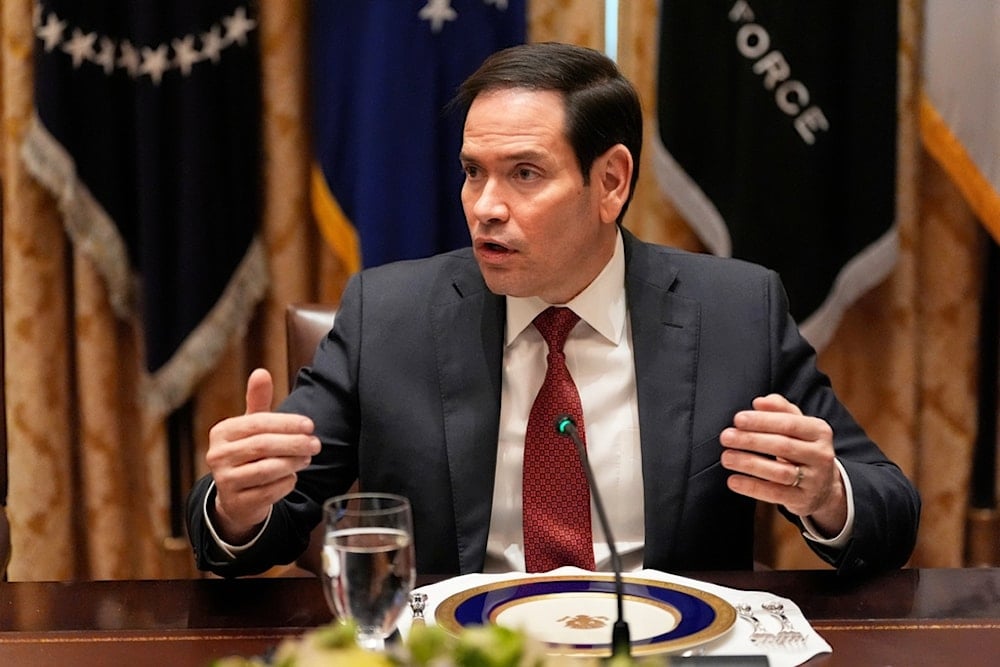Rubio leading US campaign to oust Maduro through force, sanctions: WSJ
Marco Rubio is leading a Trump administration campaign combining sanctions, military buildup, and diplomatic pressure to oust Venezuelan President Nicolas Maduro.
-

US Secretary of State Marco Rubio speaks before a lunch with President Donald Trump and Ukraine's President Volodymyr Zelensky in the Cabinet Room of the White House, Friday, Oct. 17, 2025, in Washington (AP)
US Secretary of State Marco Rubio is leading a major escalation in Washington's campaign to remove the Venezuelan leader from power, The Wall Street Journal reported on Tuesday.
The effort, launched under the guise of a counternarcotics operation, has evolved into a wider strategy that blends sanctions, diplomatic pressure, and an expanding military presence across the Caribbean, the report detailed.
Rubio, the son of Cuban immigrants and a former Florida senator, now serves as both President Donald Trump's national security advisor and top diplomat, granting him sweeping authority over US policy toward Latin America. Officials told the Journal that the goal is twofold: to halt alleged narcotics flows into the United States and to send a clear signal to Maduro that "he can no longer remain in power."
Rubio’s Caribbean offensive
President Trump has reportedly entrusted Rubio, along with Chief of Staff Susie Wiles, Deputy Chief of Staff Stephen Miller, and Attorney General Pamela Bondi, to oversee the initiative. Bondi recently doubled the US bounty on Maduro to $50 million, declaring, "Nicolás Maduro is a narco-terrorist and fugitive from American justice who has deputized terrorist organizations to stay in power. His reign will not last forever."
State Department spokesman Tommy Pigott told the newspaper, "The President is the one who drives and determines our foreign policy. It is the job of the cabinet to implement. Secretary Rubio is honored to be a part of the President's team."
The Journal said that over recent weeks, the US has carried out multiple lethal strikes on alleged drug-smuggling vessels in the Caribbean, part of a broader buildup that includes the deployment of Navy destroyers, special-operations forces, and nuclear-capable B-52 bombers near Venezuelan shores. The Pentagon maintains that the flights are routine, but officials described them to the Journal as a "show of force."
This campaign, officials added, aligns with overlapping objectives within Trump's inner circle: curbing migration, disrupting narcotics networks, and "defending the homeland" from what Rubio called "such a cancer in the Western Hemisphere." Analysts specializing in Venezuela, however, argue that Washington's strategy aims to topple the government and reclaim influence over its energy sector.
Read more: Venezuelan VP warns US hostility could disrupt global energy market
Regional flashpoint
Rubio's leadership signals a break from earlier diplomatic overtures. Former envoy Ric Grenell had proposed reopening Venezuela's oil sector to US firms in exchange for political reforms and prisoner releases, but he was sidelined mid-year. Under Rubio, Washington has tightened sanctions, carried out prisoner swaps, and ramped up military pressure.
Maduro, for his part, has denounced the campaign as a new form of imperial aggression, warning that any US attack on his country would ignite a regional response. Speaking on October 1 at a military ceremony in Caracas, he vowed that "if Venezuela is attacked, we will all be attacked," and called on Latin America to stand as "one liberating army." A week later, at the United Nations Security Council, Venezuela accused the United States of violating international law and committing "extrajudicial killings" in Caribbean waters.
Addressing Trump directly last month, Maduro said, "President Donald Trump, you must be careful because Marco Rubio wants to stain your hands with blood."

 3 Min Read
3 Min Read








